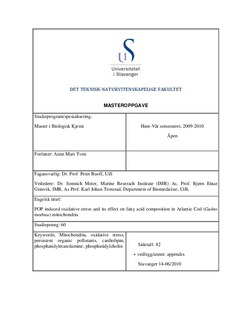| dc.contributor.author | Tveit, Anne Mari | |
| dc.date.accessioned | 2010-11-02T10:09:38Z | |
| dc.date.available | 2010-11-02T10:09:38Z | |
| dc.date.issued | 2010 | |
| dc.identifier.uri | http://hdl.handle.net/11250/182533 | |
| dc.description | Master's thesis in Biological chemistry | en_US |
| dc.description.abstract | The North Sea is becoming heavily contaminated by organic pollutants. The dominating sources of contamination are land-based releases, transport and offshore oil and gas industry. This creates a complex spectrum of different persistent contaminants accumulating in the fish in the North Sea. The dominating pollutants are Persistent Organic Pollutants (POPs) such as organic chlorinated (PCB, DDT), brominated (PBDE) and fluorinated (PFOS) compounds from industrial waste products. There are also significant discharges of hydrocarbons like poly aromated hydrocarbons (PAH) and alkylphenols (AP) from the offshore oil production and oil spills. Because organic chemicals are lipophilic they have the ability to bioaccumulate in the fatty tissue and the cell membranes in organisms making them persistent and a severe threat to the marine environment.
In this study, the effect of chlorinated, brominated and fluorinated pollutant chemicals as well as crude oil and alkylphenols, upon the mitochondrial membrane in Atlantic cod have been investigated. Fish are the most at threat from aquatic pollution and together with their long-term exposure in natural habitat they are suitable biomonitores of environmental pollution and the toxic effects. Liver is known to be a metabolic active organ and performs a number of important and complex biological functions like energy metabolism that is essential for survival. It also provides the liver cells with large amount mitochondria. In cod, this organ consists of about 70% fat, making in a natural habitat for organic pollutants entering the organism. It also plays a major role against the toxic compounds induced free radical damage by virtue of having a variety of antioxidants. ... | en_US |
| dc.language.iso | eng | en_US |
| dc.publisher | University of Stavanger, Norway | en_US |
| dc.relation.ispartofseries | Masteroppgave/UIS-TN-IMN/2010; | |
| dc.subject | biologisk kjemi | en_US |
| dc.subject | mitochondria | en_US |
| dc.subject | oxidative stress | en_US |
| dc.subject | persistent organic pollutants | en_US |
| dc.subject | cardiolipin | en_US |
| dc.subject | phosphatidyletanolamine | en_US |
| dc.subject | phosphatidylcholin | en_US |
| dc.title | POP induced oxidative stress and its effect on fatty acid composition in Atlantic Cod (Gadus morhua) mitochondria | en_US |
| dc.type | Master thesis | en_US |
| dc.subject.nsi | VDP::Mathematics and natural science: 400::Chemistry: 440::Organic chemistry: 441 | en_US |
| dc.source.pagenumber | 93 p. | en_US |
